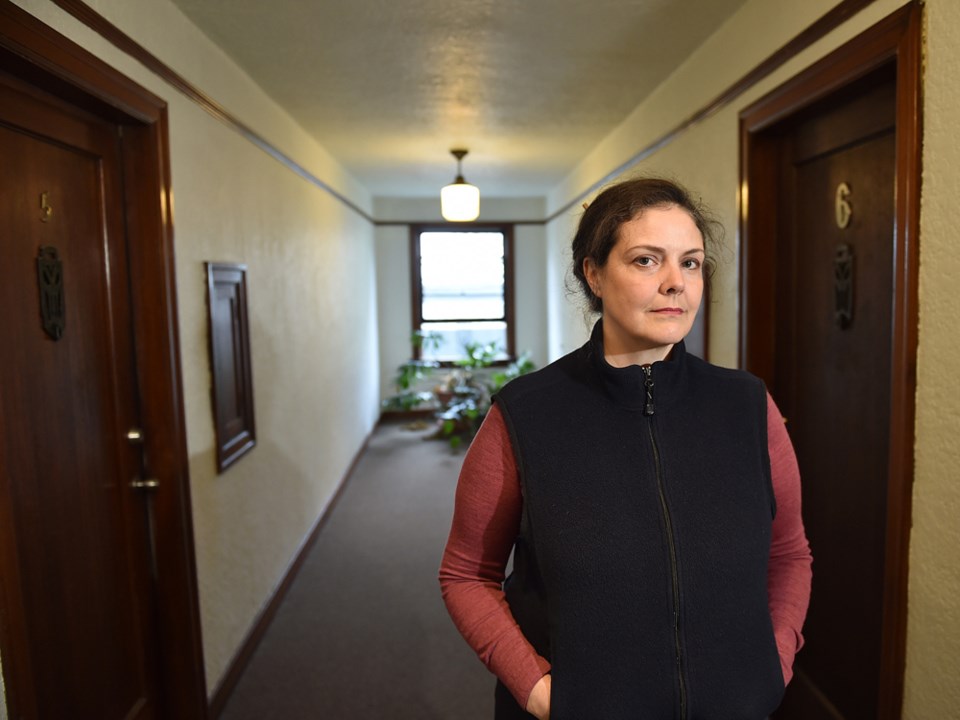Tenant advocacy groups are celebrating a recent Supreme Court ruling that overturned one woman’s renoviction that was previously allowed by the Residential Tenancy Branch.
Vivian Baumann, 53, has lived in her West End apartment for 17 years. It’s a small, older building with just 10 units.
“I do pay low rent because I’ve been here a long time,” she said, adding that the previous landlord didn’t increase the rent very often.
She said she and her fellow tenants were “incredibly nervous” when the building was purchased in 2014 and a new landlord took over. Initially, the landlord tried to increase Baumann’s rent more than the maximum allowed in a year — her rent would have gone up by more than 60 per cent, she said.
To raise the rent above the permitted amount, a landlord must either have written agreement from the tenant or an order from the Residential Tenancy Branch.
When that failed, she and other tenants were served eviction notices with the landlord claiming the suites needed to be vacated in order to carry out renovations. Baumann said she received her notice last spring.
Unable to find another affordable place to rent, Baumann appealed her eviction through the Residential Tenancy Branch. She said the landlord did not have all the proper permits in place for the renovations, something that it required under the Residential Tenancy Act. She said the landlord sent people to examine her suite, but they did little more than take photos.
“I could tell they were gathering information to make a case,” she said.
Baumann was represented by a legal advocate from the First United Church who argued that the real reason for the eviction was not the need to carry out renovations, but because the landlord wanted to move in higher-paying tenants.
“Many landlords ‘renovict’ tenants to try to get around the rent increase limitation in the law,” said Didi Dufresne, manager if legal advocacy at First United Church. “The renovation provisions in the Residential Tenancy Act are being used to evict lower paying tenants.”
In the end, after waiting six months for a decision, the eviction was upheld, but Baumann decided not to back down.
She appealed the decision in B.C. Supreme Court, and earlier this month a judge overturned the decision from the Residential Tenancy Branch.
“The facts of her case were particularly obvious what was happening. That the landlord was trying to get around the rent increase provisions of the act by renovicting her so that they could raise the rent,” Jonathan Blair, a lawyer with the Community Legal Assistance Society who represented Baumann, told the Courier.
He said there was clear evidence the landlord was acting in bad faith and had an ulterior motive.
“We are happy with the court’s decision, and for Vivian, who has endured a very stressful couple of month,” Blair said. “However, the act and the Residential Tenancy Branch need to do more to protect tenants like her from the inappropriate use of the renovation provisions in the legislation.”
He added that recently announced amendments to the act don’t go far enough.
On Thursday, the province announced changes to the Residential Tenancy Act aimed at providing better protection for renters.
“Tenants need stronger protections when a landlord is choosing to renovate or sell their property,” said Selina Robinson, Minister of Municipal Affairs and Housing. “By improving protections, renters, as well as tenants of manufactured home parks, will have better security in these difficult situations.”
The changes include a first right-of-refusal for tenants in multi-unit buildings who are evicted because the landlord needs to renovate or repair suites.
“The requirement to offer units to the original tenant will also help address improper uses of this provision by allowing the tenant to confirm that the renovations did occur,” the government press release reads.
“Unfortunately the right-of-first-refusal that has been put in place right now, it’s a right without any real substance because it doesn’t protect them from being evicted and it doesn’t allow them to come back at the rent that they were at before,” Blair said. “We were hoping that the amendments would do more to protect tenants like Vivian from the renoviction provisions being used to basically raise rents.”
“The main problem we’re seeing is just this desire by landlords, not all landlords but some, to raise the rents in a city where rents are going out of control and pushing people like Vivian, who if she had lost probably would have had to leave the city because she couldn’t afford rent.”
Baumann told the Courier her main motivation for fighting her renoviction was because she couldn’t find another place to rent in the city.
“She works full time and it doesn’t matter,” Blair said. “The rents are that expensive now.”
The Supreme Court’s decision doesn’t mean the case is closed on Baumann’s eviction — the landlord could appeal the decision. Conversely, the court ruling sends the decision back to the Residential Tenancy Branch, which could decide to order a new hearing.



